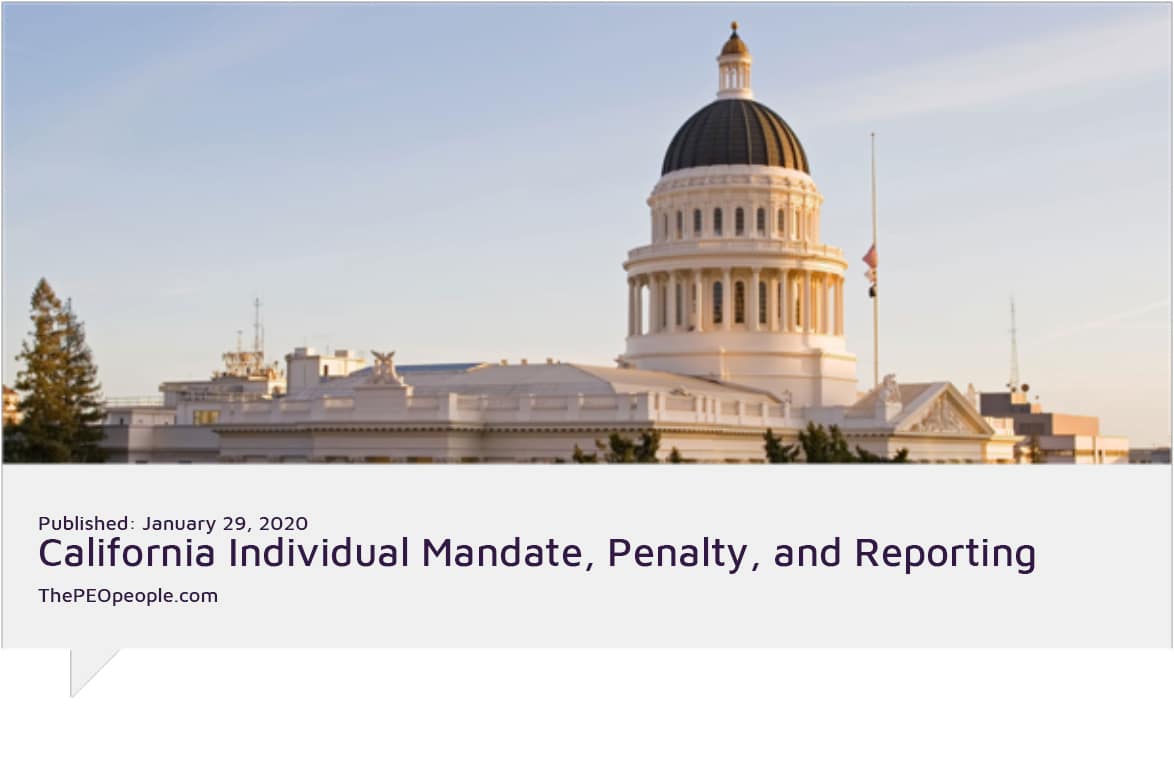
California Individual Mandate, Penalty, and Reporting
Beginning January 1, 2020, all California residents are required to have minimum essential coverage (“MEC”) for every calendar month thereafter. A penalty applies to those residents who fail to comply with the individual mandate, unless they are considered exempt.
The new state law also requires employers (and other entities) that sponsor an employment-based health plan to file reports (similar to IRS Form 1095-C or 1095-B) with California’s Franchise Tax Board on all California residents covered by the plan. These reports will enable covered employees and family members to avoid the individual mandate penalty. The initial deadline for filing reports with the Franchise Tax Board will be March 31, 2021, with respect to calendar year 2020.
The new reporting obligation for employers is subject to an important exception: if the group health plan is fully insured, and an insurance carrier is filing reports (similar to IRS Form 1095-B) with the Franchise Tax Board on covered employees and family members, then the employer does not have to file a report with the Franchise Tax Board on those same covered individuals.
California’s Individual Mandate
The new state law creates a “minimum essential coverage individual mandate” under which California residents must be enrolled in and maintain MEC for each month beginning on or after January 1, 2020. The mandate does not apply, however, for any month in which an individual:
• Has a certificate of exemption for hardship or religious conscience issued by Covered California (which is California’s insurance marketplace)
• Is a bona fide resident of another state or a U.S. possession
• Is an expatriate living outside of the U.S. who meets certain federal tax requirements
• Is a member of an Indian tribe
• Is not a citizen or national of the U.S., and is not lawfully present in the U.S.
• Is enrolled in limited or restricted scope coverage under the Medi-Cal program or another similar state program
• Is incarcerated (other than incarceration pending the disposition of charges)
• Is a member of a health care sharing ministry
For purposes of the mandate, MEC includes coverage under an employer-sponsored group health plan offered in connection with employment to an employee and related individuals (unless the plan is considered an “excepted benefit” such as limited scope dental or vision benefits that are offered separately). Other sources of MEC will also enable California residents to comply with the mandate.
California residents who fail to comply with the mandate for one or more months of the year will be liable for an “individual shared responsibility penalty” that is payable as part of their state income tax return. The penalty for the full year is equal to 2.5 percent of the individual’s adjusted gross household income, but not less than
$695 (adjusted for inflation), and not more than the state average premium for a bronze-level individual insurance policy from Covered California. California residents should contact their tax advisor for assistance in evaluating their personal situation, including whether they qualify to have the penalty waived if certain requirements are met.
Employer Reporting Obligation
The following entities providing MEC to a California resident during a calendar year are required to file a report (the “MEC report”) with both the covered individuals and the Franchise Tax Board:
• An employer or other sponsor of an employment- based health plan
• An insurance carrier offering health coverage
• Covered California with respect to individual health insurance policies
• The State Department of Health Care Services and county welfare departments with respect to coverage under a state program
• Any other provider of MEC, including the University of California with respect to student health insurance coverage
Employers and other entities sponsoring an employment- based health plan are permitted under the new state law to enter into contracts with third-party service providers, including insurance carriers, to provide the required MEC reports.
The deadline for furnishing the MEC report to covered individuals residing in California is January 31 of the following year, while the deadline for filing the MEC report with the Franchise Tax Board is March 31 of the following year. MEC reports must be in a form to be specified by the Franchise Tax Board (but similar to IRS Form 1095-C or 1095-B).
Important exception: If an insurance carrier is filing a MEC report with the Franchise Tax Board on California residents covered under a group insurance policy, then the employer or other sponsor of the group health plan is not required to file a MEC report with the Franchise Tax Board on those same covered individuals.
Employers and other entities that fail to file the required MEC report with the Franchise Tax Board are subject to a penalty of $50 per covered individual. Don’t be held liable. Find out what services PEOs can provide you and always stay up to date on compliance.
Applicable Dates
• January 1, 2020 – California’s individual mandate becomes effective for state residents
• January 31, 2021 – Deadline for providing MEC reports to individuals residing in California for calendar year 2020
• March 31, 2021 – Deadline for filing MEC reports with the Franchise Tax Board for calendar year 2020
Employer Action
Employers that sponsor a group medical plan for employees and family members residing in California may want to include information about the California minimum essential coverage individual mandate and the individual shared responsibility penalty as part of its 2020 new-hire enrollment materials and annual open enrollment materials.
During late 2020 and each year thereafter, employers with a fully insured group medical plan covering employees and family members in California should confirm with their insurance carriers that the carriers are filing MEC reports with the Franchise Tax Board. If they are, then the employer is not required to file its own MEC reports with the Franchise Tax Board on those same covered individuals.
During late 2020 and each year thereafter, employers with a self-insured group medical plan should make arrangements to file MEC reports with the Franchise Tax Board either directly or with the assistance of a third-party vendor.
Additional guidance on MEC reporting is expected.
Talk to a PEO-OLOGIST about how you can stay up to date on compliance. And spend more time running a successful business.

